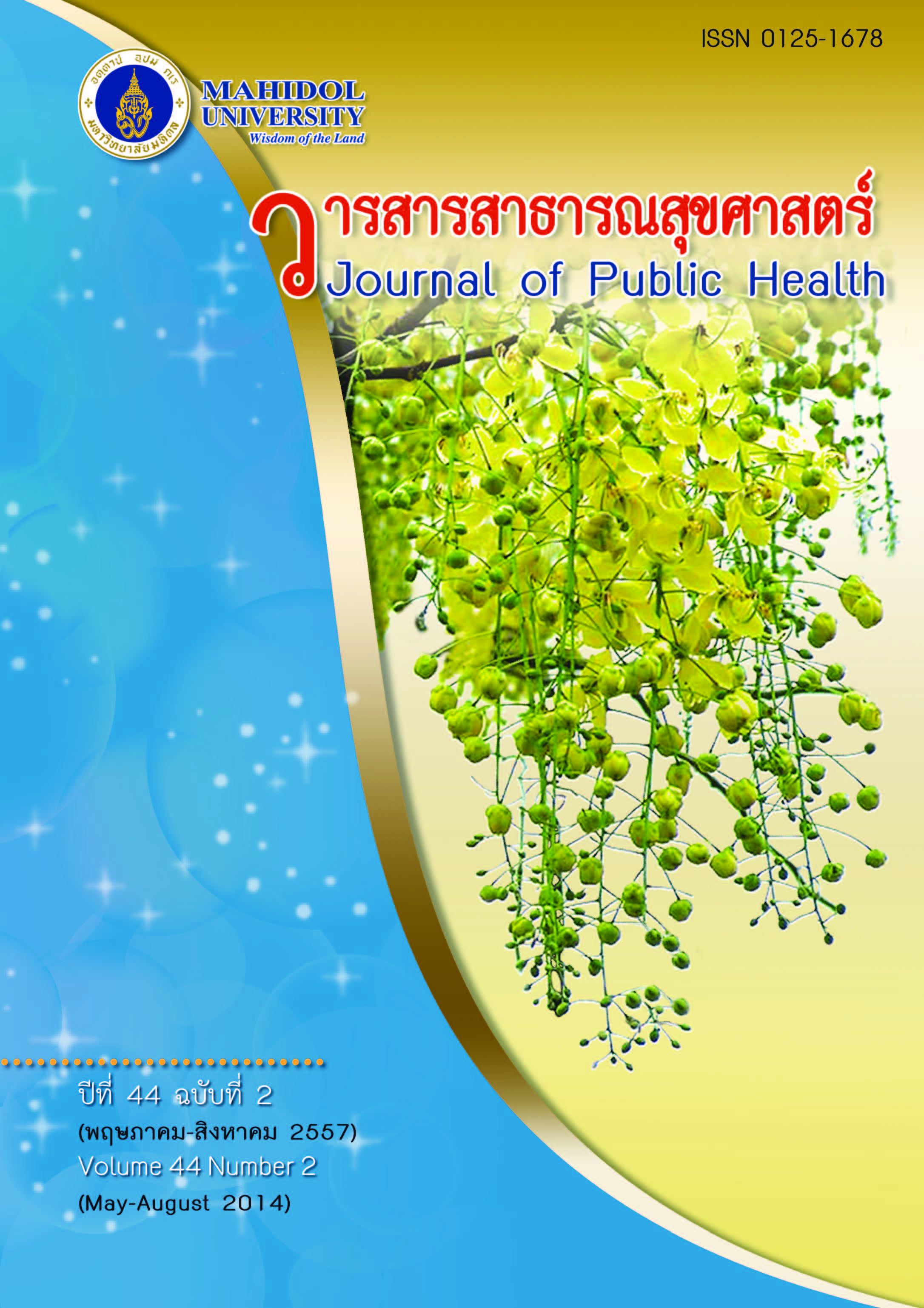การศึกษาความเป็นไปได้ในการเสริมธาตุไอโอดีนในน้ำปลาแท้ น้ำปลาผสมและน้ำเกลือปรุงอาหารเพื่อแก้ปัญหาการขาดธาตุไอโอดีนในประเทศไทย
Keywords:
ไอโอดีน, การเสริมสารอาหาร, น้ำปลาแท้, น้ำปลาผสม, น้ำเกลือปรุงอาหาร, Iodine, Fortification, Fish sauce, Mixed fish sauce, Brine for cookingAbstract
บทคัดย่อ
การขาดสารไอโอดีนยังเป็นปัญหาสาธารณสุขของประเทศไทย การเสริมสารอาหารเป็นมาตรการที่ใช้ได้ผลในทุกภูมิภาคของโลก การเสริมไอโอดีนในผลิตภัณฑ์น้ำปลาเป็นมาตรการที่ต้องพัฒนาเพื่อเพิ่มทางเลือกให้กับประชาชน โดยทำควบคู่ไปกับประเมินการได้รับสัมผัสไอโอดีน วัตถุประสงค์ศึกษาความเป็นไปได้ในการบริหารจัดการ เทคนิคการเสริม ไอโอดีน ความคงตัวและประเมินความเสี่ยงของการได้รับไอโอดีน ศึกษาโดยประมวลข้อคิดเห็นถึงแนวปฏิบัติและความเป็นไปได้ เทคนิคการเสริมในกระบวนการผลิต และประเมินคุณภาพทางประสาทสัมผัสและและความคงตัวของไอโอดีนที่การเก็บ 0, 1, 2 และ 3 เดือน ผลการศึกษาพบ ผู้มีส่วนได้ส่วนเสียให้ความเห็นว่าผลิตภัณฑ์น้ำปลาต้องไม่มีการเปลี่ยนแปลงสีและรสชาติของน้ำปลาและไม่เพิ่มความยุ่งยากในการผลิต ควรมีการบังคับใช้เป็นกฎหมาย ส่วนเทคนิคการเสริมพบว่า ควรผสมในขั้นตอนการปรุงรส ไม่พบการเปลี่ยนแปลงคุณภาพทางประสาทสัมผัสและปริมาณไอโอดีนคงเหลือมากกว่าร้อยละ 80 ตลอดการศึกษา การประเมินความเสี่ยงการได้รับสัมผัสไอโอดีนที่มีการบริโภคปริมาณที่ 97.5เปอร์เซ็นต์ไทล์ในประชากรทั้งหมดพบต่ำกว่าที่กำหนดในทุกกลุ่มอายุยกเว้นที่ปริมาณเฉพาะผู้ที่บริโภค พบเด็กอายุต่ำกว่า 9 ปี มีการได้รับสัมผัสไอโอดีนสูงกว่าที่กำหนด จึงเป็นไปได้ว่าการเสริมไอโอดีนในผลิตภัณฑ์น้ำปลาเป็นอีกมาตรการหนึ่งของไทยเพื่อใช้ในการแก้ไขปัญหา โดยจะต้องมีการเฝ้าระวังการได้รับไอโอดีนควบคู่กันไป
Feasibility Study on Iodine Fortification of Fish Sauce, Mixed Fish Sauce and Brine for Cooking in Order to Solve Iodine Deficiency Problem in Thailand
ABSTRACT
Iodine deficiency is a public health problem in most developing countries including Thailand. Fortification is a measure that is effective in all regions of the world. Development of fish sauce products fortified with iodine should be employed along with risk assessment. The objective of this study was to evaluate feasibility of having iodine directly fortified into fish sauces products in term of program management. Technical and marketing feasibilities were evaluated from the focus group meetings with representatives from the fish sauce industry. The fortified fish sauce products were tested at 0, 1, 2, and 3 months after storage for sensory quality and residual iodine. Result of the study revealed that the stakeholder agreed that iodine fortification of finished products without changing in color and taste was the most appropriate and economical strategy since it did not require additional production steps or machines. Law enforcement should be implemented. Supplement should be applied at blending step. Iodine retention was at least 80% of the fortified level at all storage time and the products’ sensory attributes did not change. There was no risk of excess iodine consumption in all population groups except for < 9 years old children who consumed fish sauces and/or the related products at 97.5 percentile of the product intake. Therefore, iodine fortification in fish sauce and related products would be another measure together with regular monitoring on iodine status of the population.
Downloads
Issue
Section
License
Creative Commons License CC-BY-ND


